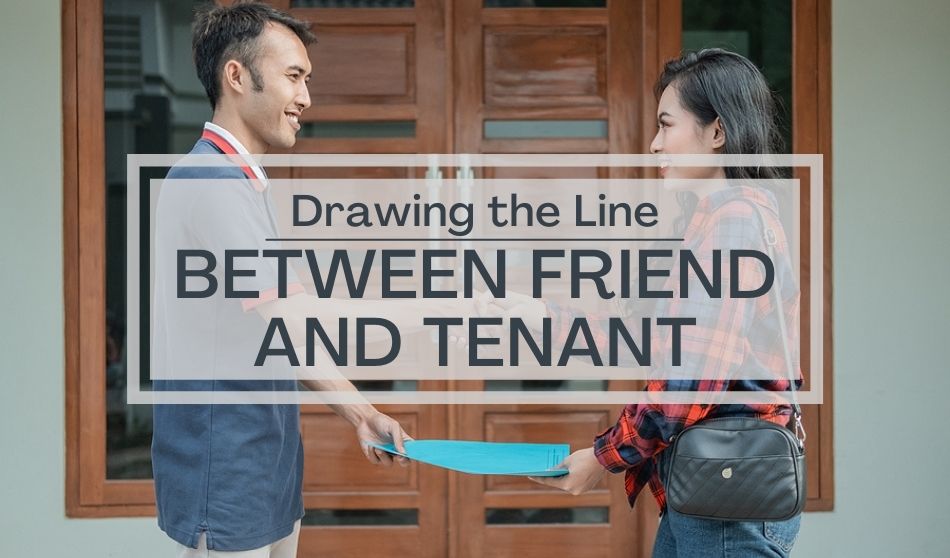It is the dream of many landlords to have the perfect tenant. A great tenant can make having a good landlord-tenant relationship feel easy. However, it can be all too easy to become friends with them. While this can initially seem like an amazing turn of events, it can end up being an issue if you are not cautious. Drawing a line between friend and tenant is crucial. While it is possible to have a landlord-tenant friendship, it is difficult to juggle. Unless you are willing to face uncomfortable solutions, it might not be the solution for you.
Establish Specific Boundaries
Establishing boundaries is key if you want to attempt to become friends with your tenants. Misunderstandings can arise and it is important to know how you plan to handle them in the future. While the boundaries will vary for everyone, there are a few starting points that should be baselines.
One such point is avoiding business talk during social meetings. For example, if you and your tenants are having dinner together, you should avoid talking about rent, maintenance issues, and various other needs that your tenants may have. If those discussions are needed, have them in a specific landlord-to-tenant meeting. If you have multiple tenants on the same property, try to avoid favoritism as well. Favoring one tenant over another is never a good situation to create.
What to Do with Tenant-Tenant Conflict
In the case that there is a tenant-tenant conflict and you need to become involved, it becomes much more difficult to do so if you are friends with either one or both parties involved. A good rule of thumb is to avoid getting involved in tenant conflict unless you absolutely need to. However, if you do need to get in the middle of it, there are certain things to be aware of.
Regardless of whether or not you are friends with one or both tenants involved in the conflict, you will likely find yourself pressured to take sides. This is an uncomfortable situation to be in normally, much less as a landlord. You should take as many precautions as possible to avoid getting involved at all. In a circumstance where your involvement is unavoidable, refer specifically to your lease agreement which should clearly spell out acceptable and unacceptable behaviors for tenants. Enforcing your tenants’ lease terms or your local regulations can allow you to resolve disputes in an unbiased manner. Issues regarding noisy neighbors during quiet hours are a great example of this concept. This is also where having a property manager that can mitigate and navigate these situations comes in handy.
How to Handle Special Treatment
When you are getting closer to and becoming friends with a tenant, it can be hard to avoid giving them special treatment (even if it is unintentional). While it might seem harmless at the beginning, it will not go over well with the other tenants on the property and can alienate them from you. Special treatment can even be considered discriminatory if some of your tenants are in a protected class. However, there are ways to make sure that everyone has some sort of a good relationship with you, even if you are closer to some.
Put together events that involve all of your tenants. This way, no one feels left out. These events can be barbeques, holiday and sports events, et cetera. Depending on how involved you are in your property as well, having conversations with all of your tenants while you are there can make them feel like they have a better connection with you. However, you need to be careful not to overdo it, otherwise, it can be detrimental in the long run. Conversations or relationships that become too personal can result in discomfort, unintentional bias, and blur professional boundaries. Your conversations could even unintentionally be breaking fair housing laws; especially if you also have these conversations with future tenants upon applying to your property.
Learn more: The Fair Housing Act: Anti-Discrimination Laws for Landlords and Property Managers
Tenants can lose their respect for you the closer you become. And the closer to them you become, you might reveal more than you intended to. The more often conversations between tenants become, the more you might accidentally reveal professional details you wanted to keep private.
Lease Details
Your lease should have the appropriate language and clauses to give you room to operate in a tenant conflict. Speaking with other landlords or property managers about what details they have in their lease is a recourse that you have if you are having difficulty knowing what to add. Writing up a standard procedure for yourself in the case of tenant disputes is a good way to keep things the same for every conflict.
What to Do This Information
Drawing the line between tenant and friend can be difficult. But that is the key to maintaining a safe and peaceful property. If you catch yourself becoming too involved with one particular tenant, take a step back from that relationship. Remember that you are your tenant’s landlord and that should be your first relationship with them.






